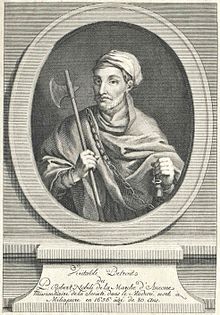Roberto de Nobili
Roberto de Nobili (born September 1577 in Montepulciano , Tuscany , † January 16, 1656 in Mylapore near Madras , India ) was a Jesuit , India missionary and linguist.
Life
De Nobili joined the Society of Jesus in 1597 and was sent on a mission to India in 1604. He arrived in Goa on May 20, 1605 and worked in Madurai from December 1606 . The Christian mission in India was led by the Portuguese at the time and paid little attention to Indian culture. In order to win over the higher castes and Brahmins to the Christian faith, de Nobili lived as a Christian sannyasin ("renunciator"), avoided public contact with the pariah and learned Sanskrit , Tamil and Telugu. He was probably the first European to speak these languages. He wanted to express the Christian faith in terms of Hindu philosophy.
Since he also externally adapted to the Indian way of life , he was accused by other missionaries and had to answer in 1619 before the Bishop of Goa. For a few years he had to interrupt his mission, but Pope Gregory XV. allowed the continuation of the new missionary method on January 31, 1623 with the bull Romanae sedis antistaneses . Nobili was also able to extend his work to Trichinopoli, where he founded a pariah congregation. In order not to jeopardize the mission with the Brahmins, he suggested in 1640 that separate missionaries be provided for the Brahmins and others for the pariah. Few of the Brahmins became Christian; he was more successful with the other higher and lower castes. In 1666 there were approximately 40,000 Christians in the Madurai Mission Area. In the last years of his life de Nobili was almost blind, was transferred to Jaffna ( Ceylon ) in 1648 and then came to Mylapore, where he died.
Aftermath
About 50 years after his death, the Jesuits and Capuchins had an accommodation dispute about the practice sought by Nobili of a careful assimilation of the European-influenced church life to Indian rites and customs, Pope Benedict XIV with the bull Omnium sollicitudinum on September 12, 1744 decided against the tolerant practice of the Jesuits.
Works
He authored over 20 religious works in Sanskrit, Tamil, and Telugu, many of which were not printed.
- Gnanopadesam . (Spiritual teaching) Ambalacatou 1673
- Āttuma Nirunayam . (Via the Soul) Madras 1889
- Agnāna Nivāranam . (Against ignorance) Trichinopoly 1891
- Tivviya Mādrigai . (The divine example) Pondichéry 1866
literature
- Anand Amaladass SJ: Mission of the Church defined by the culture of a mission country. Using the example of a misunderstood genius in the missionary history of India: Roberto de Nobili (1577-1656) . In: Thomas Franz, Hanjo Sauer (ed.): Faith in the world of today. Theology and Church after the Second Vatican Council. Festschrift for Elmar Klinger. Vol. 2: Discourse fields . Echter Verlag, Würzburg 2006. ISBN 978-3-429-02854-1 , pp. 306-318.
- Peter R. Bachmann: Roberto De Nobili 1577-1656. A missionary contribution to the Christian dialogue with Hinduism . Inst. Historicum SI, Roma 1972
- Vincent Cronin : A Pearl to India: The Life of Roberto de Nobili . Darton, Longman & Todd, London 1966, ISBN 0-232-48389-2
- Pia Maria Plechl : With a mop of hair and box cord. Roberto de Nobili (India) . St. Gabriel et al., Mödling 1977, ISBN 3-85264-108-X
- Josef Wicki: Nobili, Robert de . In: Josef Höfer , Karl Rahner (Ed.): Lexicon for Theology and Church . 2nd Edition. tape 7 . Herder, Freiburg im Breisgau 1962.
- Anand Nayak: Nobili, Roberto de. In: Biographisch-Bibliographisches Kirchenlexikon (BBKL). Volume 6, Bautz, Herzberg 1993, ISBN 3-88309-044-1 , Sp. 969-970.
Web links
- Literature by and about Roberto de Nobili in the catalog of the German National Library
- English biography
| personal data | |
|---|---|
| SURNAME | Nobili, Roberto de |
| BRIEF DESCRIPTION | Jesuit, missionary to India and linguist |
| DATE OF BIRTH | September 1577 |
| PLACE OF BIRTH | Montepulciano , Tuscany |
| DATE OF DEATH | January 16, 1656 |
| Place of death | Mylapore near Madras , India |

